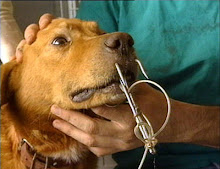Thursday, August 25, 2011
Separating A Puppy Too Early Causes What
Puppies Prematurely Separated From Their Litters Can Develop Behavioral Problems In Adulthood
According to a study published online in the Veterinary Record, puppies who are separated from their litters too soon are considerably more likely to develop possible problematic behaviors as adults in comparison to those who stay with the litter for a minimum of two months.
The Italian researchers say this is crucial as behavioral problems may affect relationships with owners and the risk of subsequent abandonment.
The discoveries were based on 140 adult dogs, half taken from their litter and adopted between the ages of 30-40 days, and the other half taken from the litter at 60 days.
All the owners of the dogs, who were clients of many veterinary clinics in Naples, Italy, were asked to complete a telephone survey regarding their dogs, such as their provenance, breed, and a range of potentially problematic behaviors.
These included destructiveness, excessive barking, possessiveness around food and/or toys, attention seeking, aggressiveness, play biting, fearfulness on walks, and reactivity to noises.
At the time of the investigation the dogs were aged between 18 months and seven years. Half of the dogs came from a pet shop, while one in three came from a relative or friend, the rest were obtained from a breed. None of the dogs in the study had come from a shelter or had been obviously traumatized.
The most frequently reported behaviors were attention seeks and reactivity to noises. Dogs that were younger than 36 months were much more likely to be destructive and to tail chase the older animals.
With the exception of pica eating, aggression towards the owner, paw licking and shadow staring, all behaviors regardless of their breed, neuter status or size, were significantly more likely among dogs who had been separated from their litter before 60 days.
Likewise, some behaviors were more common in dogs from pet shops who had been taken early from their litters than pet shop dogs who were taken at 60 days.
The authors write, it is usually accepted that dogs experience a sensitive period, the socialization period, during which the social experiences and stimuli have a larger effect on their development of their temperament and behavior than if they occur in later life.
The evidence increasingly points to a mix of early genetic, environmental and experiential factors that may permanently reconfigure the DNA, so leaving lasting effects, the authors say.
They continue, early separation from the dam and litter, especially when mixed with housing in a pet shop may affect the capacity of the puppy to adjust to new environmental settings and social relationships in later life.
Behavioral intervention can address the development of problem behaviors and enhance the dog's relationship with the owners, eventually reducing the number of dogs that are relinquished or abandoned, they conclude.
Written by Grace Rattue
Original Authors of this study were:
L. Pierantoni, DVM,
M. Albertini, DVM, PhD
F. Pirrone, DVM, PhD
CAN (Comportamento Animale Napoli), Naples, Italy
Faculty of Veterinary Medicine, University of Milan, Via Celoria 10, 20133 Milan, Italy
Subscribe to:
Post Comments (Atom)




No comments:
Post a Comment